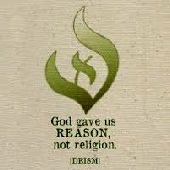




 NEXT
NEXT
 BACK
BACK

Philosophical musings on Quanta & Qualia; Materialism & Spiritualism; Science & Religion; Pragmatism & Idealism, etc.



 Recent Posts
Recent Posts
Can we have both Reason
and
Religion ?
Post 23. March 10, 2018
Deism Beyond Reason
Comparison With Christianity
This is a commentary on Roger Olson’s : Why I Am Not A Deist , in Patheos website. For perspective, he is an Arminian theologian (Dutch Reformed, Methodist; opposed to Calvinism)
http://www.patheos.com/blogs/rogereolson/2014/01/why-
In his respectful critique of Deism, he makes one telling observation : "Most deists I know do believe in more (about God) than what natural, unaided reason can discover." Although Reason is their raison d'etre, Deists cannot deny that some of their beliefs and hopes are not derived from pure Reason, but from reason supplemented with hope or speculation. So the original post-
Olson admits, "I think there’s some truth in the claim that deism is (or can be) more rational than full, robust Christianity." But he doesn't agree that Reason is sufficient to make a worldview into a religion. And I happen to agree with him. But, Olsen goes on to point-
In general, I agree with that assessment, and believe that the early Deists were misguided in their desire for a religion based on Pure Reason1. As a logical response to the Church’s use of emotional Faith as mind-
Olson makes a surprising admission that I agree with, "There is no evidence from nature and reason alone that God is good. Nor is there any evidence from nature or reason alone that the good life includes care for others unless it benefits oneself " . Indeed, his Old Testament god intervened frequently and directly in the affairs of his chosen people. But elsewhere in the world other cutures blamed miracles & calamities on their local gods. And in all times & places, bad things happened to good people, and vice-
Post 23 continued . . . click Next
1. Cult of Reason :
A secular “religion” whose only god was “the people”. It was replaced by Robespierre with a Deist religion called The Cult of the Supreme Being.
https://en.wikipedia.org/wiki/Cult_of_Reason
2. Robespierre’s cult idealized Pure Reason, but in practice believed that reason is only a means to an end. Hence, his political ends were passionately & bloodily pursued.
3. Material Cause :
The force that moves or changes a material object or a physical process. Unlike ancient gods, G*D is envisioned as the Final Cause of the whole world and its evolution toward some ultimate end.
https://en.wikipedia.org/wiki/Four_causes
4. Instead, the evils of this world must be dealt with by the moral creatures of this world. That is our role in G*D’s plan.
Critique of Pure Reason :
Immanuel Kant, in his 1781 treatise, distinguished between Pure and Practical reasoning.
Early Deists of the same era, idolized the transcend-
However, a BothAnd combination of Pure philo-
G*D is a transcendental concept, hence with no practical applications. Yet, the notion of an ideal Being can have important theo-
